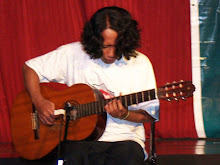.jpg)
The shoes suggested become museum pieces -
A judge announced a probe Friday into the beating and bruising of an Iraqi journalist's face moments after he hurled his shoes at President George W. Bush, and said investigators destroyed the shoes in their search for explosives. The statement to The Associated Press by Dhia al-Kinani, the investigating judge, was the first official word that Muntadhar al-Zeidi was hurt after his outburst at a news conference by Bush and Prime Minister Nouri al-Maliki. According to the judge, al-Zeidi suffered a bruised face and eyes.
Al-Zeidi has been in custody since the Sunday attack and hasn't been seen since by relatives or a lawyer. One of his brothers, Uday, alleged Friday that the isolation indicates he was abused.
"Until now, neither an attorney nor anyone from his family has seen him and this is clear evidence that Muntadhar was under intense torture," he said at a demonstration by about 20 family members just outside the Green Zone. "The investigation process is now under way in mysterious circumstances."
Al-Zeidi was wrestled to the ground seconds after throwing his shoes, and the judge said videotape of the scuffle would be studied carefully. The journalist "was beaten in the news conference and we will watch the tape and write an official letter asking for the names of those who assaulted him," the judge said. He said al-Zeidi could choose not to pursue charges related to the beating; he did not say why he decided to open an investigation. Al-Zeidi wasn't the only person who ended up with a bruised eye. White House press secretary Dana Perino suffered an eye injury when she was hit in the face with a microphone during the melee.
State Department spokesman Sean McCormack said Friday that the treatment of al-Zeidi was a matter for Iraqi authorities to deal with. "Certainly, nobody wants anybody to be mistreated while they're in custody," he said. "I can't attest to these allegations, however." Al-Zeidi's case has become a rallying point among opponents of the U.S. invasion and military presence in Iraq. A Saudi reportedly offered $10 million for just one of the shoes and an Iranian cleric suggested they should become museum pieces.
The judge, however, said investigators destroyed the shoes trying to determine if they contained explosives. He did not say whether they found any. Despite widespread sympathy for al-Zeidi among Iraqis, al-Kinani said the case cannot be dropped — though he noted that neither Bush nor al-Maliki has sought charges. Al-Maliki was standing next to Bush at the time of the attack.
"This case was filed because of an article in the law concerning the protection of the respect of sovereignty," he said. The journalist is expected to face charges of insulting a foreign leader. A conviction could bring a sentence of two years in prison.
The judge also confirmed that al-Zeidi had written a letter of apology to al-Maliki. A spokesman for al-Maliki had said Thursday that al-Zeidi asked for a pardon in the letter. But al-Zeidi's brother Dhargham told the AP that he suspected the letter was a fake.
The prime minister can recommend to Iraq's president that a pardon be granted, but the judge said such a pardon can be issued only after a conviction. There have been no indications whether or not al-Maliki is likely to recommend a pardon.
The judge said the al-Zeidi investigation would be completed and sent to the criminal court on Sunday, after which a court date would be set within seven to 10 days. Thousands of Iraqis demonstrated again Friday for al-Zeidi's release. At Friday prayers in Baghdad's Shiite stronghold Sadr City, cleric Mohanad al-Moussawi told worshippers that "al-Zeidi's life must be protected and he must be immediately, immediately, immediately released."
Sadr City protesters also laid down two American flags, hit them with shoes and burned them to protest his detention. And in southern city of Kufa, hundreds raised shoes in support of al-Zeidi and also protested what they said was the arrest by American forces of an official of Momahoudin, a militia led by anti-American cleric Muqtada al-Sadr that was disbanded and turned into a social welfare group. The U.S. military would not comment on the alleged arrest.
In London, about 50 protesters shook their shoes at the U.S. Embassy in a show of support for al-Zeidi.
In the West Bank village of Bilin, Palestinians hurled shoes rather than the usual rocks at Israeli soldiers in the weekly Friday protest against the Israeli separation barrier, which slices through their fields. And the head of a large West Bank family offered one of its eligible females as a bride for al-Zeidi. Ahmad Salim Judeh, 75, said his 500-member clan had raised $30,000 for al-Zeidi's legal defense.
Many supporters of al-Zeidi hold Bush personally responsible for the tens of thousands of Iraqi civilians who have lost their lives since the U.S.-led invasion of 2003.
On Friday, a Baghdad police official said seven disembodied heads and two complete corpses were found in a deserted building in Sadr City. The victims appeared to have been killed about two years ago, the officer said on condition of anonymity because he was not authorized to speak to reporters. (AP via Yahoo)




No comments:
Post a Comment